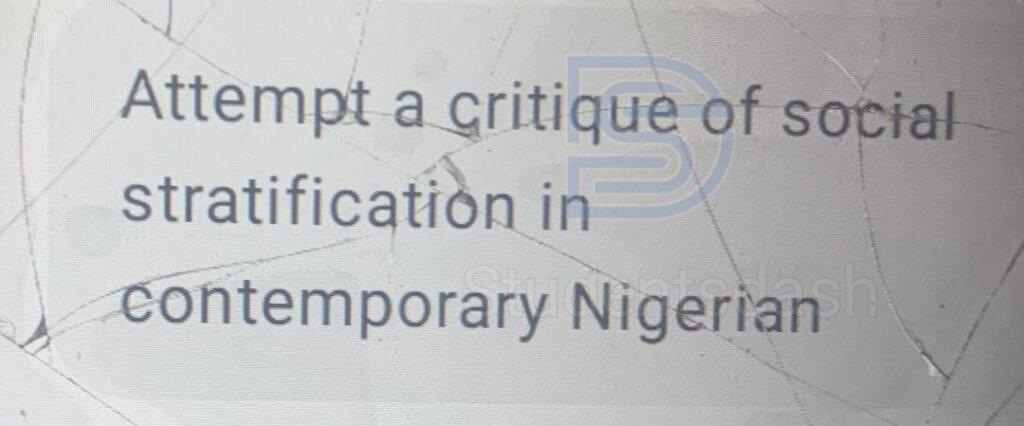SOC 106 Assignment Questions and Answers

Answers
Attempted critique of social stratification in contemporary Nigeria
Social stratification is the way people are ranked in society. In Nigeria, this ranking is clear and strong. Some people have a lot of money, power and influence. Many others have very little. This gap shapes who gets good jobs, good schools, proper health care and respect. The gap also shapes people’s dreams and the chances they get in life.
Main forms of stratification
There are many kinds of social division in Nigeria. The first is economic class. A small rich group controls large businesses, big land, government contracts and many jobs. Most people struggle to cover daily needs. Second is political power. People with political connections get jobs, contracts and favors. Third is ethnic and regional difference. Some regions and ethnic groups get more projects and better services than others. Fourth is education. Those who attend private schools, study abroad or have good tutors get better jobs and higher status. Fifth is gender and age. Women and young people often face limits because of culture, low representation and fewer opportunities.
Root causes that keep the gap wide
History plays a role. Colonial rule set uneven development and left patterns that benefit some regions and groups. The oil economy makes the problem worse. Oil money flows fast and large to the few, and this creates rent-seeking, where people try to gain money from control of resources rather than from work. Corruption and clientelism are also major causes. Offices and contracts are used to reward friends and supporters, not to serve the public. Weak institutions fail to check abuse. Unequal access to education, health care, roads and electricity keeps many people trapped. Global pressures and jobless growth push people into low-paid, unstable work while a few become richer.
Visible signs on the ground
Stratification can be seen everywhere. Cities have gated estates next to crowded slums. Private hospitals and public hospitals give very different care. Private schools and public schools give very different lessons. Young graduates wait long for decent jobs and often end up in small trading or driving. Political jobs are often given to people with connections, not always to those who are most qualified. Wealth is concentrated in families and networks that have power. These visible signs make the gap obvious and painful.
Everyday effects on people
The gap changes real lives. Children from rich homes get better exam results because they have books, tutors and quiet places to study. Children from poor homes start life with many disadvantages. Health problems that could be treated become worse for the poor because they cannot pay for good care. Those without connections struggle to get government contracts, internships or good posts. This causes low morale and wastes talent. When many people cannot find decent work, crime, unrest and migration rise.
Why this situation is wrong and harmful
First, it is unfair. Many people are not judged by ability but by birth, money or who they know. This denies equal chance. Second, it wastes human potential. When only a few get education and jobs, many smart and hardworking people cannot contribute fully. Third, it hurts the economy. When most people have low incomes, domestic demand stays weak and local businesses cannot grow. Fourth, it corrodes trust. When public funds are used by a few, people lose faith in government and institutions. Fifth, it can fuel conflict. Inequality can increase ethnic tension, protests and violence in some places. Overall, the gap weakens democracy, development and social peace.
Who benefits and who loses
The main beneficiaries are political elites, connected business people, families with long wealth and those who control resources. The losers are rural farmers, the urban poor, unemployed youth, many women and people without good education or networks. Small businesses, low-income workers and marginal communities suffer most.
Practical steps to reduce stratification
Change is possible with clear steps:
- Education for all: Invest in public schools, train teachers, provide learning materials and expand vocational training. Make higher education affordable and linked to job needs.
- Job creation: Support small and medium businesses, agriculture and local industry. Give youth skills training and start-up support. Promote industries that employ many people.
- Fight corruption: Strengthen anti-corruption bodies, enforce transparency in public spending and punish abuse. Use technology to make contracts and budgets public.
- Fair taxes and social support: Design taxes that ask the rich to pay fairly and use the money to fund health, education and social programs for the poor. Build safety nets for the most vulnerable.
- Decentralise resources: Give states and local governments real funds and capacity so development is not only in the center. Local voices must drive local projects.
- Targeted programs: Run special programs for regions and groups left behind — build schools, clinics, roads and provide scholarships for girls and rural students.
- Community benefit from resources: Make sure communities near natural resources get fair shares — local projects, jobs and compensation.
- Promote merit and access: Open public jobs to true competition and make recruitment fair. Support internships and mentorships for those without connections.
Challenges to reform
Reforms face obstacles. Those who benefit from the current system may resist change. Political will is often weak because reforms threaten elite interests. Implementation is hard when institutions are weak. Corruption can block good plans. Yet, even small steps and local successes can build momentum for wider change.
Conclusion
Social stratification in Nigeria is deep and complex. It grew from history, politics and the economy, and it hurts many people and the nation. Solutions exist and are practical. They need strong political will, honest institutions and steady public support. With better education, fairer governance, job creation and smart sharing of resources, Nigeria can reduce the gap and give more people a real chance to succeed. Small, steady reforms will matter more than promises.
